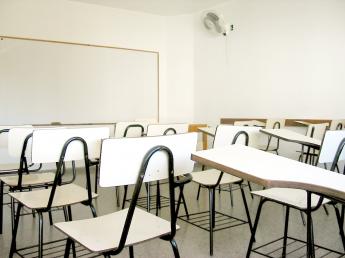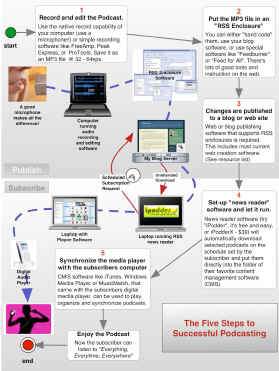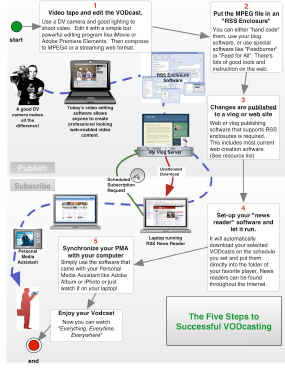the University of Missouri White Paper is a very useful and well thought out contribution to the understanding of POD/VOD- casting, not only for academia, but business, government and civil society as well.
Thanks Robin/Francis
Although Podcasting and, more recently, Vodcasting (or video-casting) have taken the online world by storm, with geeks and their like adopting these new RSS 2.0-based digital content broadcasting and distribution technologies with huge enthusiasm, their impact outside of geek-dom has, so far, been quite limited.
 Photo credit: Pilost
Photo credit: Pilost
However, in a recent white paper (PDF) published by Peter Meng, a Technical Business Analyst at the University of Missouri, the potential impact and application of these technologies in the world of education is analyzed in a clearly written and thorough manner.
The white paper, entitled "Podcasting & Vodcasting - Definitions, Discussions & Implications" and published in March 2005, provides a non-geeky description of how these technologies work, the software and hardware required, the potential applications within a higher education context and the implications on an educational organization's IT infrastructure that may result from potential wide-spread adoption among teachers and students.

The author also provides a useful set of online articles and Web sites at the end of the document for further reading, although, as Peter Meng states, "The resource list will be seriously dated before this document is distributed for the first time. The number of portals, Web sites, blogs, and vlogs that are providing podcast and vodcast services is literally changing by the hour."

Here are the key highlights of the paper relating to both potential educational applications and possible associated issues and implications:
Applications:
Issues and Implications:
In conclusion, the Paper states:
"Podcasting and vodcasting, and their pending derivatives, are not fads. They are very real and very practical distribution technologies. The ability to time-shift content versus traditional broadcast distribution models expands student teaching and learning opportunities significantly. The supporting technologies are relatively inexpensive and surprisingly easy to use - in fact easy enough to use that faculty and students will begin to actively produce and distribute content through this medium by summer semester 2005.The rapid evolution of audio-photo-video recording capabilities through phones and inexpensive hand-held devices will create a flood of multimedia content. They will be immediately adopted by the current class of students and will be looked at with disinterest or uncertainty by many of the current faculty. Both distribution technologies will quickly create demand for more bandwidth and storage for that content, both for academic purposes and student social activities.
They will intensify the need for a centralized content management and monetization infrastructure, as well as an education support architecture to assist faculty in the integration of these technologies that will be demanded
by the incoming class of students.But in this challenge is also the opportunity to provide all new classes of services for on-campus, distance and lifelong learners. In fact the greatest opportunities for these technologies are in the ways they will be used that have not been imagined yet. The portable and on-demand nature of podcasting and vodcasting make them technologies worth pursuing, implementing and supporting."
As these new digital content distribution technologies become increasingly mainstream, a multitude of potential applications will become apparent and, in many instances, will be hugely disruptive to existing learning infrastructures.
Who will adapt and thrive - and who won't?
| 2005-04-21 23:23:48 |
the University of Missouri White Paper is a very useful and well thought out contribution to the understanding of POD/VOD- casting, not only for academia, but business, government and civil society as well.
Thanks Robin/Francis
| 2005-04-18 19:16:52 |
It is a fool who steps up to predict how important an emerging technology will be, history is littered with those who foretold that we would never reach the moon, that the jet engine would never work and that C5s would take over the world.
However, I do think that pod/vodcasting will not be a disruptive technology in education. My prediction is based on experience at the UK Open University. When this wonderful organisation was launched in 69 it was hailed as the 'University of the airwaves'. Instead of lectures students would watch TV programs and listen to radio broadcasting and this would be their education. It didn't work, the OU soon learnt that printed content, phone calls and tutorials still had their place. It is to their credit that they learnt this fast and produced a very sucessful model of distance learning.
More recently in 2000 there were fresh predictions that the 'disruptive technology' of forums and html pages would replace the print/TV/tutorial OU system. Again, it didn't happen. The OU has again realised that the best distance learning model mixes many media so now its courses mostly mix web/forums/print/TV and tutorials.
My best guess is that pod and vodcasting will make an impact on education but they will not wholly replace anything, at least not in the near future. Now, where did I park my C5 :)